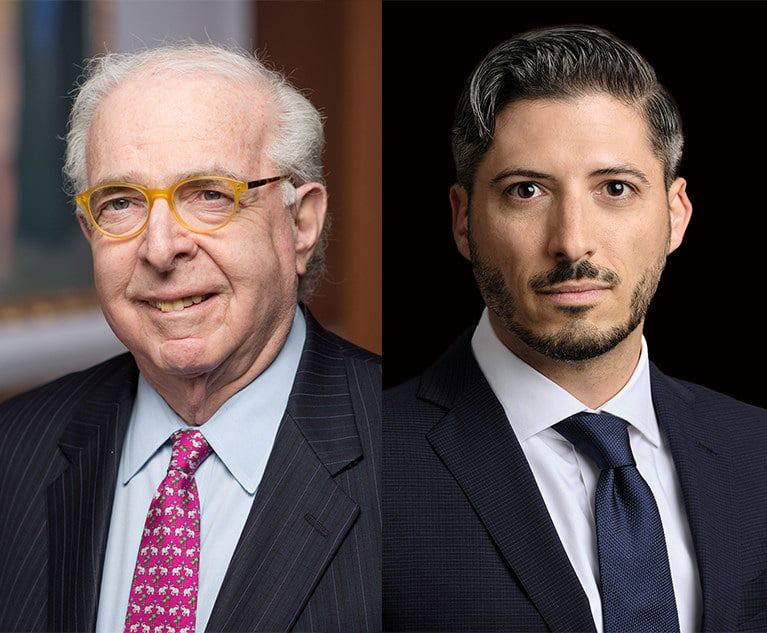The Crucial Decision: Mediate or Litigate? A Former Judge's Perspective
Larry S. Schachner writes: In most instances, deciding to mediate or litigate is a key moment in the life of a case.
November 27, 2017 at 12:00 PM
6 minute read

In most instances, deciding to mediate or litigate is a key moment in the life of a case. There is always great risk if the parties utilize the litigation process and proceed to trial. One side can have a great victory while the other side can suffer a terrible loss, or there could be a result somewhere in between. Your client could be ecstatic or extremely dismayed. There is always the possibility of an appeal, which extends the life of the case, increases costs, creates further uncertainty, and raises the possibility of a retrial. A successful mediation gives the parties certainty, controls costs, and allows the parties to maintain control over the process and the decisions that will be made. As a judge in the Trial Assignment Part (TAP), I have presided over numerous trials, and now as a private mediator, I have a unique perspective from both sides on these issues.
Litigation in court is fraught with uncertainty. Attorneys are restricted by court rules and artificial deadlines that can vary from county to county resulting in an enormous amount of wasted time. Judges are oftentimes overwhelmed by large calendars which prevent them from being able to have sufficient time and resources to devote to resolving issues and settling litigation. While sitting in TAP, I had calendars of 75 cases or more. It was simply not possible to give each case the time it deserved. The standard five-minute conference was not enough time to devote to the issues in most cases.
In my time as a mediator, I am seeing firsthand its many benefits and I believe in most instances mediation is the preferred way to proceed. Even if, in the first instance, the mediation is unsuccessful, oftentimes after following up with the parties, a settlement can eventually be reached. The mediation process is far more efficient than litigation and trial. As a practicing attorney, you have experienced the wasted time and resources involved in getting your case to the point of being ready for trial. Waiting for a dispositive motion to be decided can take six months or even more than a year. The wait, once your Note of Issue is filed, can be three to four years in some counties. Certainly, resolving your case at a mediation either during discovery or shortly after the case is put on the trial calendar, is preferable to fighting over discovery, waiting for motions to be decided, and/or waiting while your case meanders along on the trial docket. Mediation gives you the flexibility to settle your case at any point in the life of your case—pre-suit, during discovery, post note of issue, right before trial or even while the appeal is pending. The important thing about mediation is that you have control over the case during the mediation process rather than your case getting ensnared in the bureaucracy of court rules, cluttered calendars, long waits, or deadlines imposed by the court for no practical reason.
As a mediator, I can see the case from a new perspective and offer the parties fresh suggestions to move the sides towards a settlement. Parties that have been in a “litigation posture” sometimes need to recalibrate and take a more realistic view of their own case and the position of their adversary. Holding a mediation can encourage both sides to do this.
Of course, a major advantage mediation holds over litigation is being able to devote a major block of time to one case instead of a brief “Readers Digest” court conference. During the mediation, the exchanges between the parties give each side an opportunity to educate their adversary. The mediator can point out the strengths and weaknesses of each side. If appropriate, the mediator can speak with the plaintiff or the insurance carrier's representative directly. Having more time to devote to a case allows the mediator to break existing stalemates and offer new parameters to jump-start the negotiations. Even preparation for a mediation can aid in obtaining a settlement, as the preparation of a pre-mediation statement forces counsel to re-examine the strengths and weaknesses of their case.
If the mediation is not initially successful, it does not mean that the process was a waste of time. You may have narrowed the gap of differences between the parties or perhaps you learned something new about your adversary's case. At times you may learn that your opposing counsel has a view about a specific issue which you may not have fully appreciated. If you are a plaintiff's attorney, have your client attend the mediation. If unsuccessful, it will allow your client to see what you're up against, and demonstrate to him or her that you are working to get the best settlement possible. The mediation has a similar benefit for defense counsel. Even if the case wasn't resolved, it can get the carrier to re-evaluate the reserve on a case based upon updated information obtained at the mediation. As a mediator, whenever the initial mediation fails to reach a settlement, I make sure to follow up with counsel to either kick-start or renew negotiations.
Certainly, there may be situations when you will have to try your case. For example, if your adversary takes an unreasonable position, negotiations may be pointless. If there is a last-minute change in the offer or demand, a trial may be inevitable. There may be occasions where it would be wise to delay a mediation, such as when you are waiting for a key deposition or an expert review. Sometimes a carrier hasn't properly reserved the case, or the excess carrier was not put on notice or refuses to participate. If a major player refuses to attend the mediation or if a party refuses to pay its share of the mediation fee, a delay in the mediation may be necessary. While there are occasions when mediation is not appropriate, I find the majority of cases will benefit from having a neutral intervene.
In sum, the greatest benefit of mediation is that there is a good chance your case will settle. If the case doesn't initially reach a resolution, there is always value in what was learned through the process. Negotiations may have closed the gap between parties, you or your adversary may have a more realistic view of the case or optimally, the mediator will stay involved and continue the negotiations, which will hopefully result in a positive outcome for all
Larry S. Schachner is a retired justice of the Supreme Court, Bronx County. He is a member of NAM's (National Arbitration and Mediation) Hearing Officer Panel and is available to arbitrate and mediate cases throughout the United States.
This content has been archived. It is available through our partners, LexisNexis® and Bloomberg Law.
To view this content, please continue to their sites.
Not a Lexis Subscriber?
Subscribe Now
Not a Bloomberg Law Subscriber?
Subscribe Now
NOT FOR REPRINT
© 2025 ALM Global, LLC, All Rights Reserved. Request academic re-use from www.copyright.com. All other uses, submit a request to [email protected]. For more information visit Asset & Logo Licensing.
You Might Like
View All
Art of the Settlement: Trump Attorney Reveals Strategy in ABC Lawsuit

Evolving Legal Standards to Combat Disqualification of Arbitrators for Failing to Disclose Conflicts of Interest
8 minute read
Court of Appeals Holds that Arbitration Agreements Can Be Formed Through ‘Clickwrap’ Process
8 minute read
Trending Stories
- 1'Quiet, Appropriate End:' NY Court of Appeals Formally Removes Erin Gall From Bench
- 2Just One Cookie? Justices to Decide Liability for Half-Truths
- 340% Contingency: A New Ruling Just Cost This Lawyer $827K in Legal Fees
- 4Runners-Up and Shout-Outs for Litigator of the Week
- 5Sorry. We Can't Get to Your Case: Judge Speaks Out on Judicial Shortages
Who Got The Work
Michael G. Bongiorno, Andrew Scott Dulberg and Elizabeth E. Driscoll from Wilmer Cutler Pickering Hale and Dorr have stepped in to represent Symbotic Inc., an A.I.-enabled technology platform that focuses on increasing supply chain efficiency, and other defendants in a pending shareholder derivative lawsuit. The case, filed Oct. 2 in Massachusetts District Court by the Brown Law Firm on behalf of Stephen Austen, accuses certain officers and directors of misleading investors in regard to Symbotic's potential for margin growth by failing to disclose that the company was not equipped to timely deploy its systems or manage expenses through project delays. The case, assigned to U.S. District Judge Nathaniel M. Gorton, is 1:24-cv-12522, Austen v. Cohen et al.
Who Got The Work
Edmund Polubinski and Marie Killmond of Davis Polk & Wardwell have entered appearances for data platform software development company MongoDB and other defendants in a pending shareholder derivative lawsuit. The action, filed Oct. 7 in New York Southern District Court by the Brown Law Firm, accuses the company's directors and/or officers of falsely expressing confidence in the company’s restructuring of its sales incentive plan and downplaying the severity of decreases in its upfront commitments. The case is 1:24-cv-07594, Roy v. Ittycheria et al.
Who Got The Work
Amy O. Bruchs and Kurt F. Ellison of Michael Best & Friedrich have entered appearances for Epic Systems Corp. in a pending employment discrimination lawsuit. The suit was filed Sept. 7 in Wisconsin Western District Court by Levine Eisberner LLC and Siri & Glimstad on behalf of a project manager who claims that he was wrongfully terminated after applying for a religious exemption to the defendant's COVID-19 vaccine mandate. The case, assigned to U.S. Magistrate Judge Anita Marie Boor, is 3:24-cv-00630, Secker, Nathan v. Epic Systems Corporation.
Who Got The Work
David X. Sullivan, Thomas J. Finn and Gregory A. Hall from McCarter & English have entered appearances for Sunrun Installation Services in a pending civil rights lawsuit. The complaint was filed Sept. 4 in Connecticut District Court by attorney Robert M. Berke on behalf of former employee George Edward Steins, who was arrested and charged with employing an unregistered home improvement salesperson. The complaint alleges that had Sunrun informed the Connecticut Department of Consumer Protection that the plaintiff's employment had ended in 2017 and that he no longer held Sunrun's home improvement contractor license, he would not have been hit with charges, which were dismissed in May 2024. The case, assigned to U.S. District Judge Jeffrey A. Meyer, is 3:24-cv-01423, Steins v. Sunrun, Inc. et al.
Who Got The Work
Greenberg Traurig shareholder Joshua L. Raskin has entered an appearance for boohoo.com UK Ltd. in a pending patent infringement lawsuit. The suit, filed Sept. 3 in Texas Eastern District Court by Rozier Hardt McDonough on behalf of Alto Dynamics, asserts five patents related to an online shopping platform. The case, assigned to U.S. District Judge Rodney Gilstrap, is 2:24-cv-00719, Alto Dynamics, LLC v. boohoo.com UK Limited.
Featured Firms
Law Offices of Gary Martin Hays & Associates, P.C.
(470) 294-1674
Law Offices of Mark E. Salomone
(857) 444-6468
Smith & Hassler
(713) 739-1250






